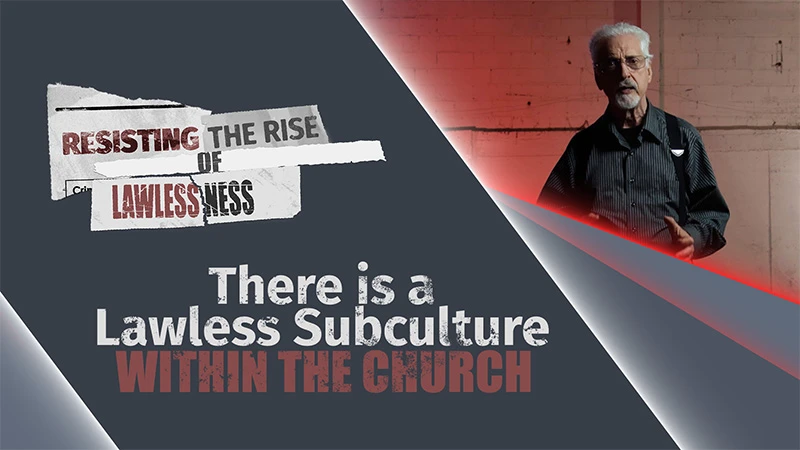
The Need for Church Discipline to Help Sex Addicts
It was December 1993, and I was ticked! I sat across the desk from my pastor who told me that I’d have to leave the church until I got my life in order. Even though I had repeatedly binged on drugs and illicit sex, I didn’t want to accept responsibility for my actions. After working with me for several years, he finally acknowledged that there was nothing else he could do for me. “But I do know a place in Kentucky…” he said.
Well, my life changed at Pure Life Ministries, and I thank God my pastor took a stand with me. Since that time, I have been involved in some situations where church discipline was used effectively by the pastor, but unfortunately, many pastors haven’t utilized this God-given tool for restoration. “I have tried everything to help this guy,” is frequently what I hear. However, upon further questioning, it usually turns out that “everything” did not include church discipline! In light of the overwhelming problem of sexual sin in the Body of Christ, I would say that it is time that this powerful tool is restored to our churches!
{{blog-si="/blog-ads-storage"}}
Quite honestly, excommunication from a church (like I experienced) should be the last step in a lengthy process of correction. Working with an erring believer also involves discipleship, correction, and reproof. But if a person will not repent, there comes a time when he must be dealt with more severely.
The New Testament handles this subject very specifically. In Matthew 18:15-17 the Lord gives step-by-step instructions on how to help a person who continues in habitual sin.
“And if your brother sins go and reprove him in private; if he listens to you, you have won your brother. But if he does not listen to you, take one or two more with you, so that by the mouth of two or three witnesses every fact may be confirmed. And if he refuses to listen to them, tell it to the church; and if he refuses to listen even to the church, let him be to you as a Gentile and a tax-gatherer.” (Matthew 18:15-17)
The Process of Church Discipline
1. Reprove in private
In the situation the Lord relates, the Christian who sees a brother in sin is instructed to reprove (Gk. elegcho) that person. He later made the statement, “Those whom I love, I reprove and discipline...” (Revelation 3:19)
Unquestionably, biblical reproof done in the right spirit (cf. Gal. 6:1; II Timothy 2:25) is the most loving tool a pastor can use to help a struggling saint. In fact, Paul lists it as one of the primary usages of the Word: “All Scripture is inspired by God and profitable for teaching, for reproof, for correction, for training in righteousness.” (II Timothy 3:16) The pastor who only uses the Word for teaching is limiting his ministry to one-fourth of its power!
2. Reprove with two witnesses
Although some men want their sin (and will not listen), I am convinced that many whom I’ve dealt with over the years would have been stopped in their tracks by a timely word of reproof and on-going “correction” and “training in righteousness.” Sometimes the pastor may get to the point where he feels the erring believer is not taking his sin seriously, not honestly responding. What does he do now? Follow the formula Jesus gives: confront him with “two or three witnesses.” Having two church elders present will help the man to sense the gravity of his sin. This might be just enough of a wake-up call to bring him to true repentance.
3. Bring the sin before the entire church
If the sinner “refuses to listen to them, tell it to the church,” Jesus said. Up until this point, his privacy has been carefully protected, but once the pastor begins to sense that the man is refusing the correction, he is instructed to bring the sin into the light for all to see. Now the situation is treated with even more gravity. This man’s future (and possibly even his eternity) is at stake! He needs to wake up! Perhaps the shame of being exposed before the entire church will be enough to help him repent.
4. Treat the sinner as an unbeliever
However, Jesus goes on to say, “if he refuses to listen even to the church, let him be to you as a Gentile and a tax-gatherer.” This is the last step to reach the erring brother. This may seem extreme, but God takes drastic measures whenever there is an unrepentant sinner in the camp. Dr. Jay Adams said, “No one should be put out of the church because of his sin (as though some sins require discipline and others do not). No, precisely not that. It is the failure to ‘hear’ that moves discipline to the final stage of putting one out of your midst.”(1)
We find an example of this in I Corinthians 5 where a man was living in sin with his father’s wife. In this instance the man needed to be brought to the final stage of church discipline quickly: “Remove the wicked man from among yourselves,” Paul told the church. This is the procedure my pastor rightly used with me.
The Purpose of Church Discipline
Without a doubt it takes a great deal of courage for a pastor in our day and age to excommunicate an unrepentant sinner. Not only must the pastor face the man’s anger, but the members of his church may misunderstand his intentions. Nevertheless, there are three very important reasons why it must be done.
First, the spiritual integrity of the church must be maintained. Paul said, “Clean out the old leaven, that you may be a new lump...” (I Corinthians 5:7) Leaven illustrates the contagious and corrupting power of sin. A church that is tolerant of sin will soon be full of compromise.
Second, when someone in sin is dealt with openly, it causes the other members of the Body to comprehend the seriousness of sin. Paul told Timothy, “Those who continue in sin, rebuke in the presence of all, so that the rest also may be fearful of sinning.” (I Timothy 5:20) This seems to be a forgotten concept in many of today’s “user-friendly” churches.
Third, it is done to save an unrepentant sinner from his sin. (1 Corinthians 5:5) Paul told the Corinthians, “I have decided to deliver such a one to Satan for the destruction of his flesh, that his spirit may be saved in the day of the Lord Jesus.” We must remember that God is more concerned about a person’s eternal destiny than He is about his temporary comfort. If a person refuses to repent, the time will come when God will “give them over” to their sin. (Romans 1:24, 26) This happened to the man in Corinth, and we find out later that he repented of his sin. (II Corinthians 2:6-8) The complete restoration of an erring believer is the ultimate goal of church discipline.
Remember the man in Corinth, that Paul removed from the church? We find out later in 2 Corinthians 2:6-8 that he repented of his sin. We must keep in mind that God is more concerned about a person’s eternal destiny than He is about his temporary comfort. The complete restoration of an erring believer is the ultimate goal of church discipline.
Is there a place in 21st century Christianity for church discipline? Absolutely! Our loving Savior has been in the business of correcting wayward souls for a long time. I think it is time we return to the methods offered to us by He who created us. Don’t you?
Dr. Jay E. Adams, Christian Counselor’s Commentary on I & II Corinthians, P & R Pub., p. 34.

















